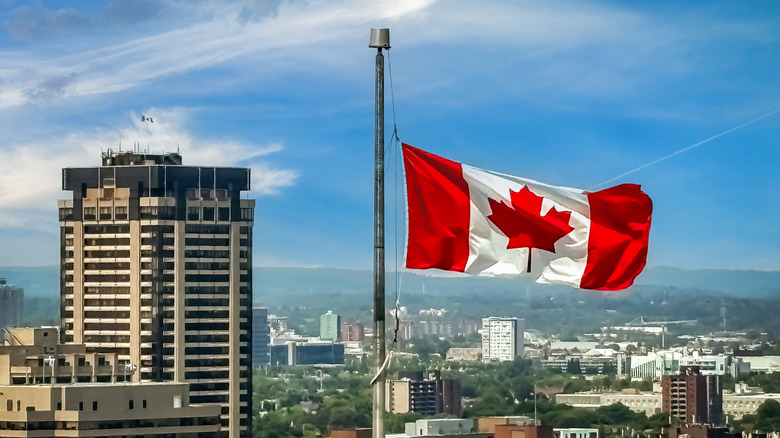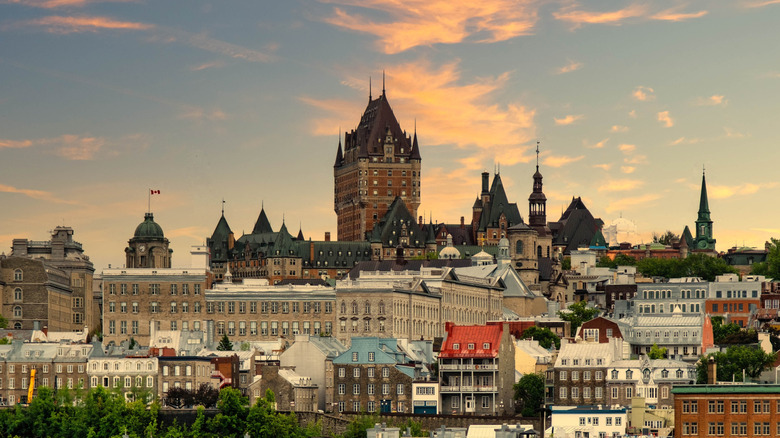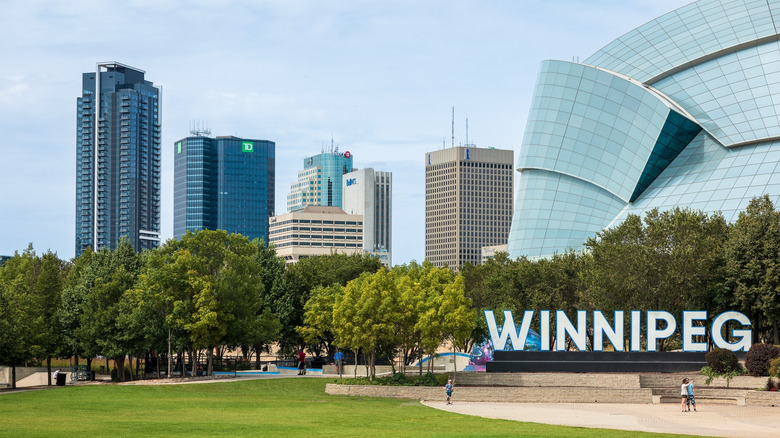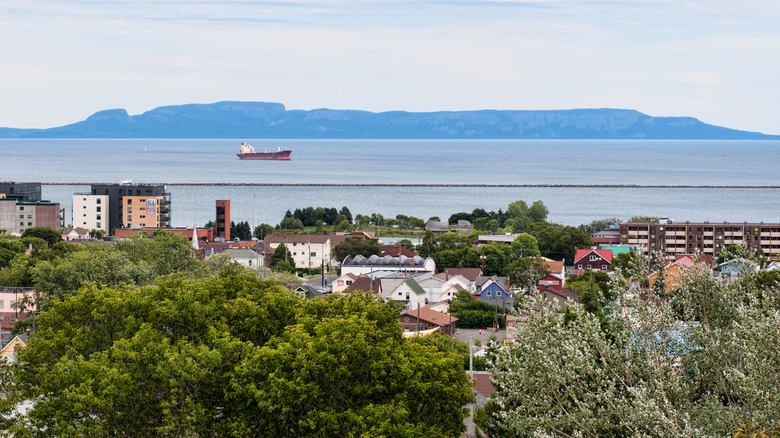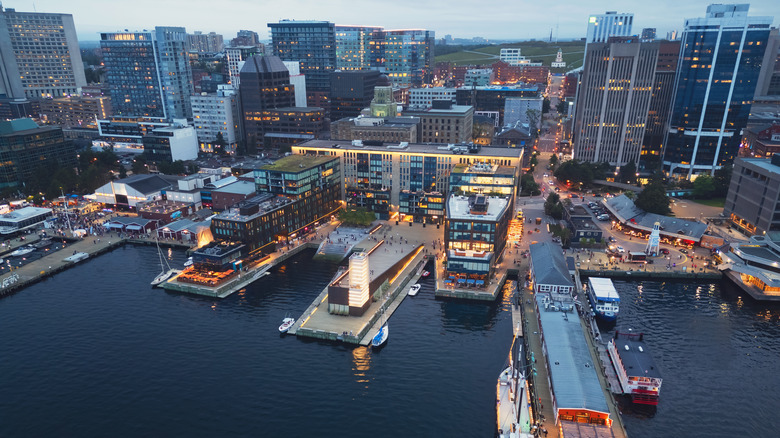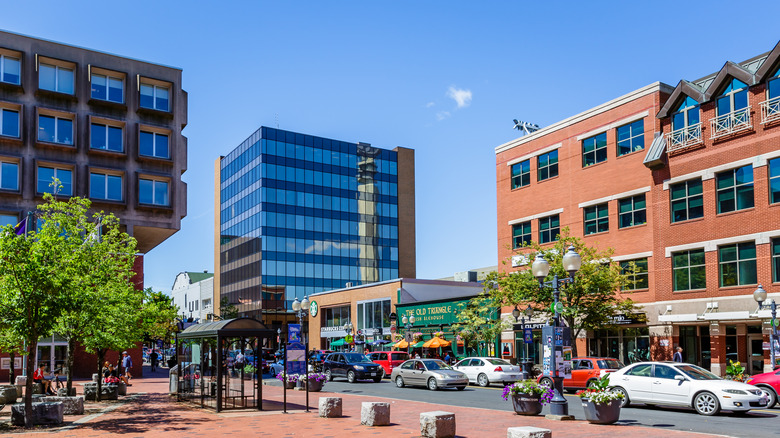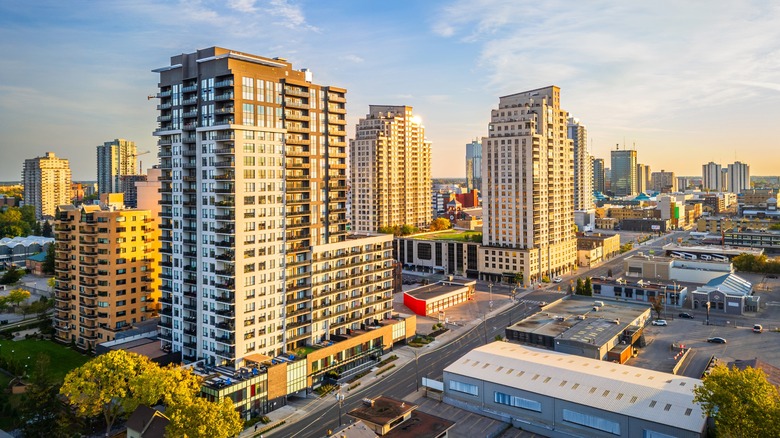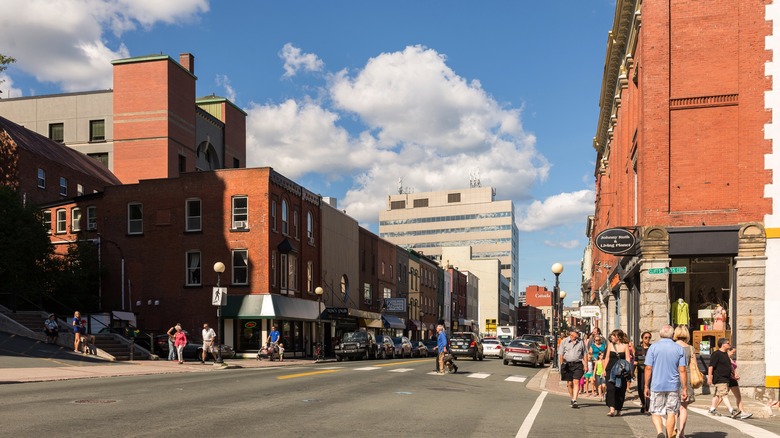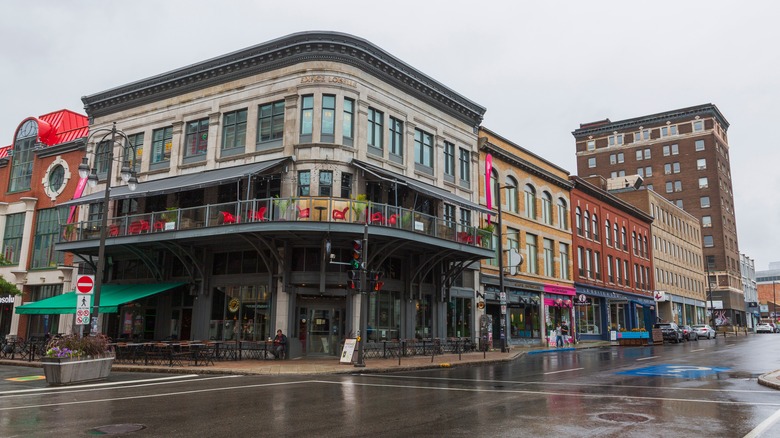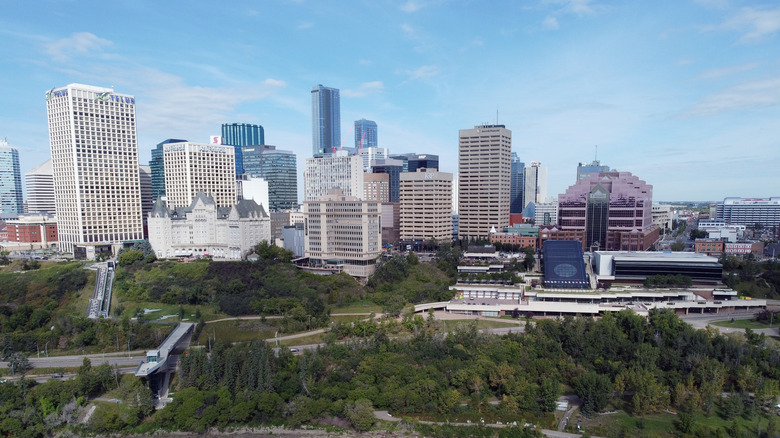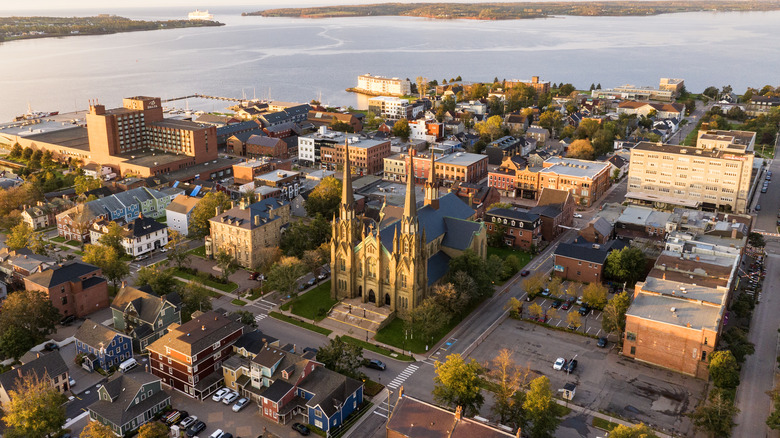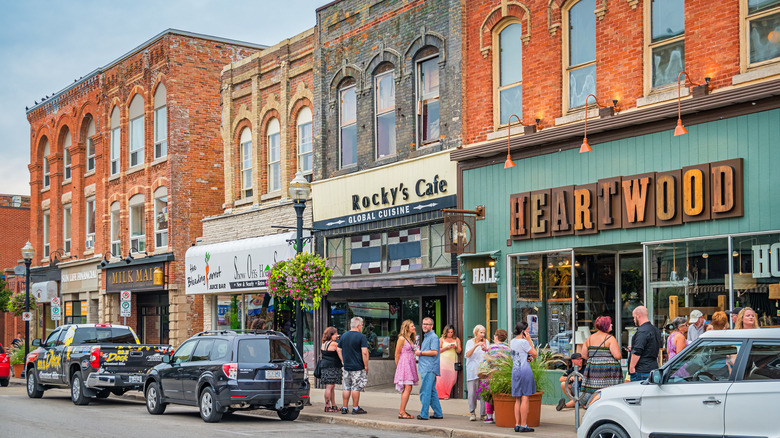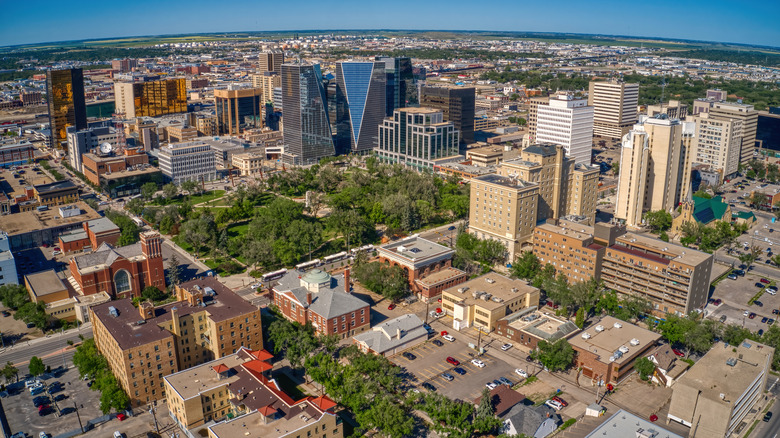The 12 Most Affordable Places To Live In Canada
It's fairly common to hear Americans express interest in moving to Canada. With the rising cost of living in the United States and shifting socio-political landscapes, some feel that relocating to America's northern neighbor could allow for a fresh start. The median income in the United States is reportedly $77,000 per year. Meanwhile, the average cost of living for Canadians ranges from $1,980 to $2,330 monthly, taking into consideration the exchange rate.
When considering relocating to Canada, it's important to remember that while the standard of living is similar to that in America, the costs vary by location. Larger cities like Toronto will be very expensive; if you're relocating from a rural area of the U.S., such locations may be more pricey than what you're used to. If you're hoping to relocate to Canada on a budget, consider Manitoba, Nova Scotia, and New Brunswick. Canadians living in these provinces often experience more comfortable lifestyles as rent, housing, and utilities are more budget-friendly. It's no secret that a big move can be expensive, especially if you are headed out of the United States. If affordability is a top concern, we recommend relocating to one of these picturesque Canadian cities. Prices are listed in U.S. dollars.
Quebec City is a gateway to old-world French charm
While everyone knows about Montreal, Québec City, Québec, is another culturally rich destination. Many find that this city bridges old European charm with modern sensibilities. Housing prices currently average about $330,000 USD. Likewise, would-be renters can expect to spend between $930 and $1,900 per month; your final price will depend on factors such as location and the number of bedrooms. One thing to keep in mind is that the local housing market is very strong, and as of late 2025, demand remains high. Utility pricing in Québec City is reasonable overall, though heating and electricity costs can increase substantially between January and February; the general cost of electric heating during these months is typically between $90 and $100.
Whether Québec City is a good fit might come down to culture. In this province, French is the main language spoken by its citizens, followed by English. While you may be able to read signs and communicate a bit, it's helpful when moving here to know a little French or be willing to learn. As friendly and affordable as Québec City is, those who move will likely feel that taking on a new language to make the most of the experience would be worth it.
Winnipeg comes with very affordable housing, and a cold caveat
If you're deterred from settling in larger Canadian cities due to housing prices, then we strongly recommend Winnipeg. As the capital city of Manitoba, Winnipeg is often called the "cultural cradle of Canada." Here, you'll experience festivals year-round, take in cultural touchstones such as Canada's Royal Winnipeg Ballet, and also gain important local and national historical insight through the Canadian Museum for Human Rights.
When looking for a home, you'll be pleased to know that Winnipeg houses are priced nearly $239,000 less than the national average. Rental pricing is also ideal, with apartments starting at about $930 for a studio. If you're relocating with the hopes of landing a job in the area, ZipRecruiter claims that the local salary is about $51,031 per year, which works out to about $25 per hour. Single people who bring home at least $35,000 should find the city affordable, while families that bring in double the income should be able to live comfortably here.
As much as Winnipeg has to offer, there is one unavoidable downside: the harsh winter. It can get especially chilly here, and if you're someone who doesn't like frigid weather and struggles to dress appropriately for the colder seasons, then you might want to pass on settling down in this city.
Thunder Bay brings lower food costs and lots of amenities
Thunder Bay, Ontario offers a pleasant snapshot of all that's wonderful about Canada. Whether you're a fan of the outdoors or someone who wants to take in urban culture, there's always something to do. Thunder Bay is home to multiple institutes of higher learning, giving it somewhat of a "college town" feel. Yet there are more than 100 area parks and close to 34 miles of paved trails.
Even with all its various amenities, Thunder Bay remains a cost-friendly choice for newcomers; the city is said to be the 8th-most affordable city in Ontario for housing. As of 2023, the median housing price is said to be $239,000. If you're hoping to find a job here after moving, keep in mind that the average salary for this city is about $51,000, a little lower than the Canadian average of $54,450. While you might pay a bit less for food and housing, you could find that transportation and healthcare costs are higher than in other locations. Even so, Thunder Bay remains a strong contender for Americans who want the feel and comfort of a small but stylish city without worrying about excessive living costs.
Halifax brings Celtic charm and a slower pace
According to Moving2Canada, Halifax, Nova Scotia holds the distinction of being "the largest city east of Quebec." Even so, people are immigrating to the area in favor of a slower, more relaxed pace of life. Nova Scotia is among the most sparsely populated Canadian provinces overall, home to just over a million people. By comparison, the population of the Toronto metropolitan area exceeds seven million.
Any job seekers relocating to the area should know that the median salary before taxes is $52,900, which is slightly below the national average. Aspiring homeowners will be glad to learn that Halifax ranked 5th out of 10 benchmark Canadian cities for affordable housing. As of 2024, the average home costs roughly $389,567. Meanwhile, renters should expect to spend about $1,185 per month.
While Halifax is affordable at the moment, housing prices are on the rise as a growing number of people immigrate to the area, drawn by lower costs and a more relaxed lifestyle. If you wait too long, you could find yourself priced out. If you're worried about costs, but still a fan of Halifax, it may be possible to relocate to one of the smaller towns nearby.
Moncton has strong job market and multicultural vibe
If you want to experience a diverse, multicultural atmosphere with lower taxes and housing costs, then we strongly recommend Moncton, New Brunswick. It may be the most populous location in its province, but this distinction comes without the higher cost of living associated with Canada's largest cities. Moncton's median housing price was $301,051 as of August 2025, representing a 0.48% month-over-month decrease from July. Those looking to rent a local apartment can expect to spend around $1,530 per month, although rental prices can vary depending on certain factors, such as location and apartment size.
One strong advantage of relocating to this affordable Canadian city is its job market. Moncton is home to a range of large companies, including tech businesses, constantly on the lookout for new talent. In addition to a strong local economy, Moncton has several hospitals and clinics, making it relatively easy to access good-quality, modern healthcare treatment.
Despite its advantages, one drawback is that winters can be rough. If you're not used to particularly cold weather, you may not be a fan of Moncton. While the city does have a public transit system, it's not necessarily as advanced as what's found in larger cities, meaning you'll likely need a reliable vehicle for transportation. If these factors aren't long-term deterrents, Moncton could offer the fresh start you're looking for.
London offers big city feeling without the pricing
There are a few reasons to consider moving to London, Ontario. According to the London Economic Development Corporation (LEDC), it's not only the 11th largest city in the nation, but also "one of Canada's fastest-growing and increasingly diverse cities." The LEDC also states that with rental prices at around $1,544 per month and house prices averaging $300,774, London is among "the most competitive housing markets" in the country. According to Career Beacon, the average yearly income for London residents is $95,700 before taxes.
With good earning potential and reasonable housing prices, it's no wonder that London's population has seen accelerated growth in recent years. As immigrants flock to the Ontario city from all over, the location has become increasingly diverse and multicultural; if you are seeking variety and a chance to connect to people from all over, relocating to London makes perfect sense. One downside here, as with other spots across Canada, is that winters can get very cold, with lows of 14°F. On the plus side, London's infrastructure makes it easy to get around no matter the season, whether you take advantage of bike and walking paths or its public bus system.
St. John's is the city with Canada's best-priced houses
You may not find a better time than now to take advantage of St. John's housing market, as the Newfoundland and Labrador capital city is currently ranked the top market in the country for its affordable housing. At $253,122, its benchmark pricing is much lower than both Winnipeg and Quebec City, the nearest lowest major markets for house seekers. Budget-friendly housing is something the local government takes very seriously, as the city announced a Housing Accelerator Fund on its official website. If you prefer to rent an apartment, you can expect to pay about $798 for a two-bedroom apartment. When food shopping, expect to spend at least $200 per person each month. As for utility bills, the monthly bill should average about $100. Between housing and living expenses, it's easy to see how many in Newfoundland can afford to live comfortably.
Those relocating to St. John's will find that it provides modern, reasonably-priced healthcare services and relatively low transportation costs. However, one major caveat is that the rocky local landscape means that it's not a place known for agriculture. Because of the need to ship produce in from other Canadian provinces or the United States, some food items may cost more than what you're used to paying at present. If food pricing is not a deterrent, then St. John's is definitely a city worth moving to.
Trois-Rivières has Cirque du Soleil every summer
As the name suggests, Trois-Rivières, Québec, is a city surrounded by water. With homes going for about $265,000, it is among the most budget-friendly housing markets in the country. The cost of living is reportedly about $2,407 per month for a single person who rents, according to Career Beacon.
In addition to paddle boarding and visits to the lakeside, newcomers can also take advantage of hundreds of miles of forest trails, perfect for hiking and mountain biking. If you're not the outdoorsy type, you can take in the Cirque du Soleil every summer or take in the city's European-inspired historic district. There's no major traffic congestion, making commutes to work relatively easy. Speaking of employment, Trois-Rivières has a strengthening job market, home to opportunities to connect with large and small businesses alike.
Not only is the local healthcare infrastructure excellent, but Trois-Rivières boasts a lower crime rate than the national average. In terms of affordability and safety, Trois-Rivières is a hidden gem. Be aware that, as with much of Québec, the local language is French. Although there are many English speakers, you may still encounter a slight language barrier.
Edmonton offers an affordable housing cheat code
Edmonton, Alberta is made up of a mixture of people of all walks of life. Whether immigrants or indigenous Canadians, you will find many cultures proudly represented. In addition to a multicultural aspect, Edmonton is less than an hour away from Elk Island National Park. Within the city, there are about fifty festivals per year, meaning there's always an event to look forward to, no matter the time of year.
With houses averaging $333,842 according to local real estate monitors, this city boasts a cost-friendly housing market, though the type of house you buy could help you save even more. For instance, you could purchase a condo and spend $145,000; likewise, you could buy a townhouse for $227,000. Using this housing cheat code could help you settle into the home of your dreams for a fraction of what you could expect to spend in Canada's largest cities. Renting is also an option, with apartments costing between $725 and $2,200 monthly.
As cost-effective as relocating to Edmonton would be for housing, the one major downside of a move here would be food prices, which are among the most expensive in all of Canada. When grocery shopping, you can expect to spend between $290 and $1,200 per month. The infrastructure is also less than ideal, and there are some concerns about local crime. That said, there are good neighborhoods that could make settling down here worthwhile.
Charlottetown has a highly walkable and historic downtown
With a population of approximately 86,000 people, the capital of Prince Edward Island, Charlottetown, brings quintessential small-city charm. Though this city is thought to be home to nearly a third of the Prince Edward Island province, you won't feel too crowded. Charlottetown residents have the advantage of a highly walkable downtown area, itself a historic remnant of the pre-car era of Canadian life. Local amenities also include white sand beaches, golf courses, and nearby villages. The coastal region brings access to fresh seafood, though there are a variety of restaurant styles to choose from.
The area's median housing price is approximately $349,010 according to Houseful, keeping Charlottetown within the range of affordability for many aspiring homeowners. One-bedroom rentals cost an average of nearly $874 per month. If you plan to move here, it may be a good idea to have a remote position or already have a job secured, as the local unemployment rate currently stands at 10%, which is the second-highest among all Canadian provinces. If you need to get around, you'll want to have a car, as upwards of 90% of locals use a vehicle as their primary means of transportation.
Owen Sound mixes historic influence with modern city life
Owen Sound was once called a "Cultural Capital of Canada," and a closer look at this small Ontario city makes it easy to understand why. The influence of the Ojibway, Odawa, and Bodéwadmi Nations is keenly felt. In addition to paying tribute to indigenous influence, Owen Sound benefits from a multicultural modern scene. Locals get to enjoy a range of events, from the Festival of the Northern Lights to the Salmon Spectacular fishing derby. With a population of nearly 22,000, Owen Sound brings diverse urban vibes without ever feeling too crowded.
As of September 2025 on Zolo, the median price of Owen Sound homes for sale is $342,994; houses are going relatively fast, with houses only staying on the market about a month before purchase. If a house catches your eye, you'll want to move fast. For anyone hoping to land a local job, salaries are reportedly around $2,740 per month. With the cost of living estimated to be $1703, the pay rate should make life in Owen Sound very affordable for most.
Regina is great for sunshine and a comfortable living standard
According to the city's official website, Regina, Saskatchewan is the 16th-largest city in Canada; it's also the nation's "sunniest capital." If you're used to living in an environment with four distinct seasons, then Regina will feel just like home. Aside from good weather, another positive benefit of moving to this city is its strong local economy. Thanks to the rising number of businesses that call this city home, the employment rate is high, and should stay that way for some time. Commuters can save hundreds of dollars per year when using the public transit system instead of driving, a perk that adds to Regina's overall affordable nature.
The housing and rental market in Regina is very affordable. You can expect to pay at least $750 per month in rent; some apartments go for $1,300 or more, but it will depend on a combination of location, apartment size, and the number of bedrooms. If buying a house, the median market price is about $380,000 according to Remax.
While moving to Regina is great for savings, there are a few caveats. For instance, the city is located in a frigid, landlocked region of Canada. If you're relocating here from a large city, you might find the nightlife to be somewhat lacking. That aside, Regina does have much to offer to those who want a budget-friendly and comfortable lifestyle.
